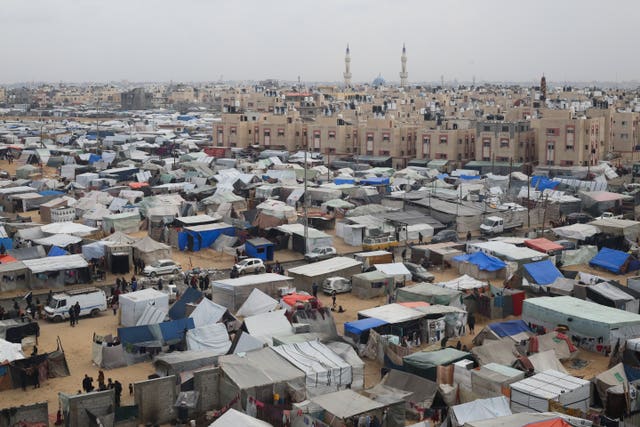UK will continue allowing arms exports to Israel – Cameron
The Foreign Secretary said the latest legal assessment left the Government’s position on arms exports unchanged.

The UK will not suspend arms exports to Israel following the killing of seven aid workers in an air strike last week, the Foreign Secretary has confirmed.
Lord Cameron said he had reviewed the most recent legal advice about the situation in Gaza, and this left the UK’s position on export licences “unchanged”.
Speaking at a press conference in Washington DC, he said: “This is consistent with the advice that I and other ministers have received, and as ever we will keep the position under review.”
The Government has faced increasing pressure to suspend licences for arms exports to Israel following the deaths of three British nationals in an air strike that killed seven people working for the humanitarian group World Central Kitchen.
Lord Cameron said continuing to allow arms exports put the UK in line with other “like-minded countries” and reiterated that the UK had a “robust legal process” for assessing those licences.

Lord Cameron said: “We are a Government under the law and that’s as it should be.”
But Labour’s shadow foreign secretary David Lammy said Lord Cameron’s refusal to publish the legal advice was “simply not good enough” and demanded that he submit to questioning by the House of Commons.

He added: “It’s vital the UK is not complicit in any breach. If there is a clear risk that UK arms might be used in a serious breach of international humanitarian law, the Government must suspend the sale of those arms.”
Aid organisation Care International UK said the Foreign Secretary’s statement appeared to contradict the precedent set in 2014 when the Government said it would suspend some licences as a “precautionary step” if it could not “clarify if the export licence criteria are being met”.
Care’s head of advocacy and policy, Dorothy Sang, said: “The Government’s criteria for arms exports are clear that licences should not be granted where there is a clear risk that the items might be used in violation of international humanitarian law.
“Gaza is experiencing a manmade humanitarian crisis. Over 33,000 Palestinians and 200 aid workers have been killed during this conflict. Famine is imminent if not already present in the north of Gaza.
“The UK Government must now follow its own advice and suspend arms export licenses to Israel.”
Other humanitarian organisations have also criticised the decision.
Amnesty International said the announcement was “sadly predictable” and a “missed opportunity”, while ActionAid said “alarmed” and urged the Foreign Secretary to publish the legal advice he had received.

Downing Street denied there was any difference between the two men’s public statements, and on Tuesday Lord Cameron reiterated the UK’s support for Israel’s “legitimate right to self-defence to deal with the Hamas threat”.
He also repeated his calls for more aid to flow into Gaza and for the territory to be “deconflicted” to allow that aid to be distributed, warning that more humanitarian workers could be killed if this did not happen.
Lord Cameron’s press conference alongside US Secretary of State Antony Blinken came as Israeli prime minister Benjamin Netanyahu escalated his threats to carry out a ground invasion of Rafah, in southern Gaza.

With an invasion of Rafah becoming an increasing possibility, Lord Cameron told reporters the international community may need to start considering a “plan B”.
He said: “We have a very clear plan A for how we bring this conflict to an end.
“We have a temporary pause, we turn that into a sustainable ceasefire, we see Hamas leaders removed from Gaza, we see the terrorist infrastructure taken down. That is the way to have a political process that brings the war to an end.
“But we have to be aware if that doesn’t work, we have to think about what is plan B, what can humanitarian and other organisations do to make sure that if there is a conflict in Rafah that people can achieve safety, they can get food, they can get water, they can get medicine, and people are kept safe.
In a video statement, Mr Netanyahu said there was now a date for an invasion of Rafah. At Tuesday’s press conference, Mr Blinken said the US had not been made aware of any such date.





